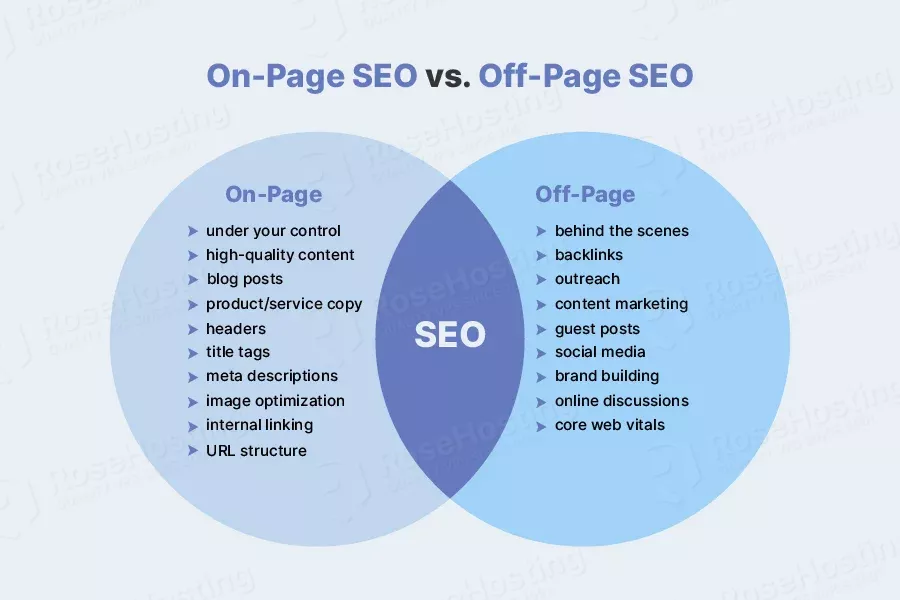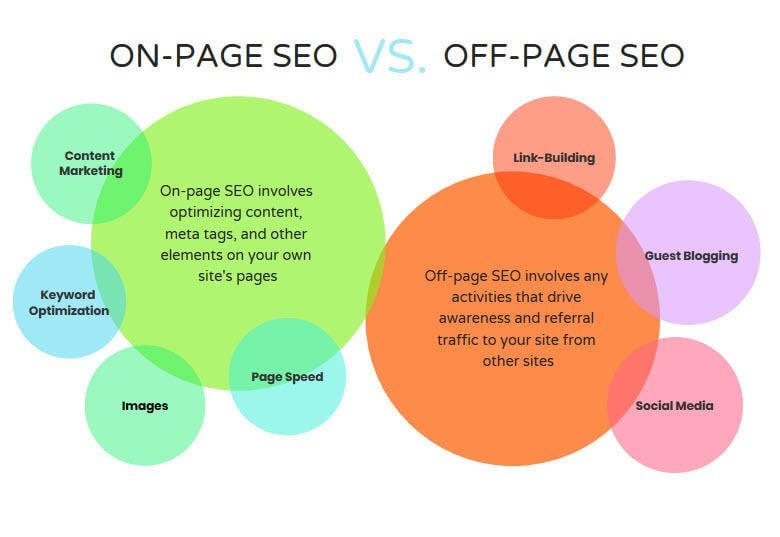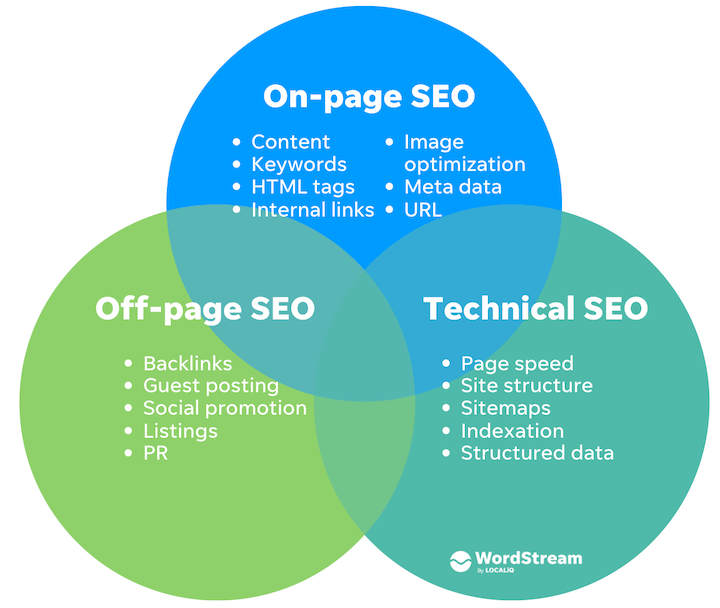Discover the secret to ranking higher in search engines by understanding the crucial differences between on-page and off-page SEO strategies.

Image courtesy of via DALL-E 3
Table of Contents
Do you have a website and want more people to see it? That’s where SEO comes in! SEO stands for Search Engine Optimization, and it’s like a magic recipe to make your website show up more on search engines like Google. There are two main types of SEO: On-Page SEO and Off-Page SEO. Today, we’ll talk about what they are and why they’re important for your website.
What is SEO?
SEO stands for Search Engine Optimization. It is a way to make your website more visible on search engines like Google, Bing, or Yahoo. When someone searches for something online, the search engine looks through all the websites to find the most relevant ones to show on the search results page. SEO helps websites rank higher in these results, making them more likely to be seen by people searching for information.
How Search Engines Work
Search engines use special algorithms to find, crawl, and index websites. They look at factors like keywords, content quality, meta tags, and links to determine the relevance and authority of a website. Based on these factors, search engines rank websites to show the most helpful and trustworthy results to the user.
Why Ranking Matters
Being on the first page of search results is crucial because most people only click on the top few results. If your website appears on the first page, you are more likely to get visitors who are looking for what you offer. This can lead to more traffic, visibility, and potential customers for your website.
Understanding On-Page SEO
When it comes to improving your website’s visibility on search engines, On-Page SEO plays a crucial role. But what exactly is On-Page SEO? Let’s break it down in simple terms.
Content Quality
One of the key aspects of On-Page SEO is creating high-quality content. This means producing articles, blog posts, or other materials that are valuable, relevant, and engaging to your audience. By using the right words, also known as keywords, in your content, you can help search engines understand what your website is about.
Meta Tags
Meta tags are snippets of text that describe the content of a webpage. Including relevant meta tags in your HTML code can help search engines better understand the content of your site, making it easier for them to rank your pages accordingly.
Internal Linking
Internal linking involves linking different pages of your website together. By creating a network of links within your own site, you can help users navigate your content more easily and boost your SEO. Search engines also use internal links to discover and index new pages on your site.
Understanding Off-Page SEO
Off-Page SEO is an essential part of making your website more visible on search engines. While On-Page SEO focuses on optimizing your website directly, Off-Page SEO involves activities done outside of your website that can impact your search engine rankings.

Image courtesy of via Google Images
Backlinks
One important aspect of Off-Page SEO is building backlinks. Backlinks are links from other websites that lead back to your site. Search engines see backlinks as a vote of confidence in your content, helping to boost your website’s authority and credibility. The more quality backlinks you have, the better your site’s chances of ranking higher in search results.
Social Media Presence
Having a strong presence on social media platforms like Facebook, Instagram, and Twitter can also benefit your website’s SEO. By sharing your content on social media and engaging with your audience, you can drive more traffic to your site and increase its visibility. Search engines take into account social signals when determining rankings, so being active on social media can have a positive impact on your SEO.
Guest Posting
Guest posting is another Off-Page SEO strategy that involves writing articles or blog posts for other websites in your industry. By contributing valuable content to reputable sites, you can establish yourself as an authority in your field and attract more visitors to your own website through backlinks included in your guest posts. This not only helps to drive traffic to your site but also enhances your site’s credibility in the eyes of search engines.
Comparing On-Page and Off-Page SEO
When it comes to improving your website’s visibility on search engines, you’ll often hear about two key strategies: On-Page SEO and Off-Page SEO. Let’s take a closer look at how these two tactics differ and how they can benefit your website.
Direct Control vs. Influence
On-Page SEO is all about the changes you can directly make on your website, such as optimizing content, meta tags, and internal linking. You have full control over these elements and can tailor them to align with search engine algorithms. In contrast, Off-Page SEO relies on external factors like backlinks and social media signals, where you have less direct control. Building a strong network of quality backlinks and engaging on social media platforms can boost your website’s authority and visibility, but it requires influencing others to link back to your site.
Short-Term vs. Long-Term Effects
One of the key differences between On-Page and Off-Page SEO lies in the timeline of their effects. Changes made through On-Page SEO, such as updating content or improving website speed, can show results relatively quickly. In comparison, Off-Page SEO efforts like earning backlinks and enhancing social media presence may take longer to yield visible results. However, the long-term benefits of off-page strategies can significantly enhance your website’s authority and organic traffic over time, making it a valuable investment for sustainable growth.
Steps to Improve On-Page SEO
When it comes to improving your website’s visibility on search engines, On-Page SEO plays a crucial role. By making strategic changes directly on your website, you can enhance your chances of ranking higher in search results. Here are some simple steps you can take to boost your On-Page SEO:

Image courtesy of via Google Images
Use Good Keywords
One of the fundamental aspects of On-Page SEO is using relevant keywords throughout your website. Think about words or phrases that people might type into search engines when looking for content similar to yours. By incorporating these keywords into your titles, headings, and body content, you can improve your chances of being found by your target audience.
Improve Website Speed
Website speed is a critical factor for both user experience and SEO. If your site takes too long to load, visitors are more likely to leave, leading to higher bounce rates. Search engines also favor fast-loading websites, so optimizing your site’s speed can positively impact your SEO performance. Consider reducing image sizes, optimizing code, and leveraging browser caching to improve your website’s speed.
Create Great Content
In the world of SEO, content is king. Creating high-quality, engaging content that provides value to your audience is essential for improving your On-Page SEO. Publish well-written articles, blog posts, and other forms of content that address the needs and interests of your target audience. Remember to use your chosen keywords strategically within your content while ensuring it remains natural and informative.
Steps to Improve Off-Page SEO
When it comes to boosting your website’s visibility on search engines, Off-Page SEO plays a crucial role. Here are some simple steps you can take to enhance your Off-Page SEO efforts.
Build Quality Backlinks
One of the most effective ways to improve Off-Page SEO is by acquiring quality backlinks from other reputable websites. Backlinks act as a vote of confidence for your website, indicating to search engines that your content is valuable and trustworthy. Focus on getting backlinks from websites that are relevant to your niche and have a high domain authority.
Be Active on Social Media
Social media platforms are not just for connecting with friends and family; they can also be powerful tools for boosting your website’s SEO. By sharing your content on platforms like Facebook, Twitter, and LinkedIn, you can drive more traffic to your site and improve your online presence. Engage with users, respond to comments, and participate in discussions to increase your social media visibility.
Network with Influencers
Building relationships with influencers in your industry can have a significant impact on your Off-Page SEO efforts. When influencers share your content with their followers, it can lead to increased website traffic, brand awareness, and valuable backlinks. Look for influencers who align with your brand values and reach out to them for collaboration opportunities.
Tools to Help with SEO
There are various tools available that can assist you in improving your website’s visibility on search engines. These tools can help with both On-Page and Off-Page SEO efforts. Let’s take a look at a few popular ones:

Image courtesy of via Google Images
Google Analytics
Google Analytics is a free tool offered by Google that provides valuable insights into your website’s performance. It can help you track your website traffic, user behavior, and conversion rates. By understanding these metrics, you can make informed decisions to optimize your website for better SEO results.
Yoast SEO
Yoast SEO is a popular WordPress plugin that can help you improve your On-Page SEO efforts. It provides suggestions for optimizing your content, such as ensuring proper keyword usage, meta tags, and readability. Yoast SEO also offers features like XML sitemaps and social media integration to enhance your website’s overall SEO performance.
Ahrefs
Ahrefs is a comprehensive SEO tool that specializes in Off-Page SEO, particularly backlink tracking. Backlinks are links from other websites that point to your site, and they play a crucial role in determining your website’s authority and ranking. Ahrefs allows you to monitor your backlink profile, analyze your competitors’ strategies, and identify potential opportunities for building high-quality backlinks to boost your SEO efforts.
Conclusion
In this blog post, we’ve explored the world of SEO and discussed the differences between On-Page and Off-Page SEO. Remember, SEO stands for Search Engine Optimization, which is crucial for making your website more visible on search engines like Google. On-Page SEO involves making direct changes to your website, such as creating quality content, using the right keywords, and internal linking, to boost its visibility. On the other hand, Off-Page SEO focuses on activities outside your website, like backlink building, social media presence, and guest posting, to enhance your website’s visibility.
It’s important to strike a balance between On-Page and Off-Page SEO strategies to maximize your online presence. On-Page SEO allows you to have direct control over your website, while Off-Page SEO relies on external factors. While On-Page changes can show results quicker, Off-Page efforts yield long-term benefits that grow over time. By implementing both types of SEO effectively, you can improve your website’s visibility and attract more organic traffic.
Remember to use good keywords, create high-quality content, and build quality backlinks to enhance your SEO efforts. It’s also essential to monitor your website’s performance using tools like Google Analytics, Yoast SEO, and Ahrefs to track and improve your SEO strategy over time.
So, whether you’re a business owner, blogger, or website owner, understanding and implementing both On-Page and Off-Page SEO techniques can help you climb the search engine rankings and reach a wider audience. Keep experimenting, learning, and tweaking your SEO strategy to stay ahead in the digital landscape.
Frequently Asked Questions (FAQs)
What is the easiest way to start with SEO?
Starting with SEO doesn’t have to be complicated. Begin by choosing relevant keywords that people might use when searching for your content. Make sure your website has quality, informative content that answers questions and provides value to visitors. Additionally, pay attention to your website’s speed and ensure it loads quickly. These simple steps can lay a strong foundation for your SEO efforts.
How long does it take to see SEO results?
SEO is a long-term investment, and it may take some time to see noticeable results. Changes made to your website for On-Page SEO can often show effects relatively quickly, sometimes within a few weeks. However, the benefits of Off-Page SEO, such as earning backlinks and building social media presence, typically take longer to manifest. It’s important to be patient and consistent with your SEO strategies to see lasting improvements in your website’s search engine rankings.
Can I do SEO by myself?
Absolutely! While SEO can seem intimidating at first, many aspects of it can be learned and implemented by website owners themselves. There are numerous resources available online, such as guides, tutorials, and tools, that can help you understand and improve your website’s SEO. By dedicating time and effort to learning about SEO best practices and staying updated on industry trends, you can effectively optimize your website for search engines and increase its visibility online. Remember, consistency and perseverance are key when it comes to mastering SEO.







